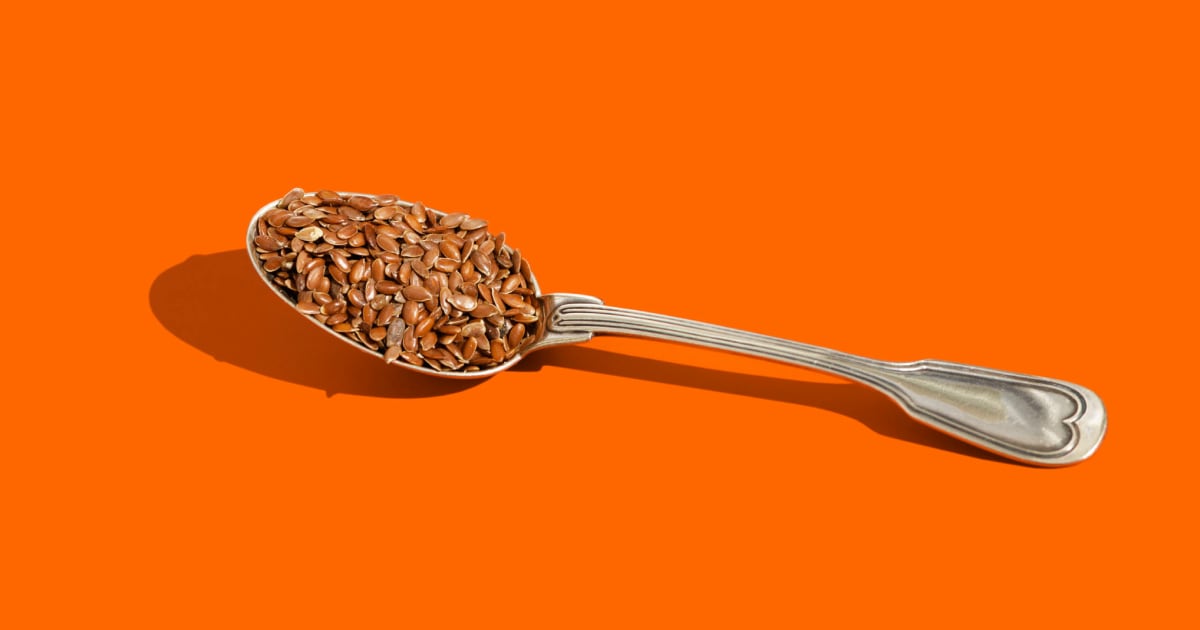
If you’re eating fruits, vegetables, legumes and seeds, you’re likely consuming plant estrogen — a group of naturally occurring compounds that can act like a weaker form of the female sex hormone.
The official name is phytoestrogen, an “estrogen-like substance” found in some plants and plant products that may have anticancer effects, according to the National Cancer Institute.
Phytoestrogen refers to 20 compounds found in different species of plants, says registered dietitian Natalie Rizzo, nutrition editor for TODAY.
The two main types are lignans, present in high concentrations in some seeds; and isoflavones, mainly found in soybeans and soy products.
“Phytoestrogen has a similar chemical structure to human estrogen, but it is different,” Rizzo notes.
“Eating foods with soy may affect human estrogen levels, but it depends on exposure, ethnicity, hormone levels and health status. Specifically, soy isoflavones can bind to estrogen receptors in the body and may actually cause a slight increase or decrease in estrogen.”
It depends on the existing levels of estrogen hormones in the body, she adds.
In women of reproductive age, phytoestrogen may “compete” with the sex hormone produced by their body to bind to estrogen receptors, blocking the real estrogen’s action, research has found. This can have a mild anti-estrogenic effect.
In women who have low levels of estrogen after menopause, phytoestrogen may act like a weaker version of the sex hormone, producing a mild estrogenic effect.
Who should avoid eating soy or other foods with plant estrogen?
The only reason to avoid food with phytoestrogen is if a person is allergic to it, Rizzo says.
Are soy products safe?
“There is a myth that people with breast cancer should avoid soy, but the research actually shows that soy consumption may actually reduce the risk of death from breast cancer,” Rizzo notes.
That’s because soy isoflavones that bind to estrogen receptors block “the more potent natural estrogens” in the blood, which are linked to some types of breast cancer, according to the American Cancer Society.
Soy foods are healthy and safe, the organization notes. It recommends people get the nutrients by eating whole soy foods, not by taking soy supplements, which can contain much higher amounts of isoflavones.
Christie Siebel, a senior clinical dietitian at the University of Texas MD Anderson Cancer Center and a breast cancer survivor, says soy is generally safe to eat, even for people with cancer.
“Soy is a great alternative to animal protein to include in your daily diet,” she wrote on the clinic’s website. “There’s no reason to avoid eating soy.”
Which plants are high in estrogen?
A wide variety of plants make phytoestrogen. Here is a list of foods with the two main types:
Foods with isoflavones:
Isoflavones are present in legumes and soy-based foods, Rizzo says. They include:
- Soybeans
- Tofu
- Edamame
- Tempeh
- Soy milk
- Lentils
- Chickpeas
- Kidney beans
Foods with lignans:
Lignans are found in certain seeds, grains, fruits and vegetables. They include:
- Flaxseed. This is “by far the richest dietary source,” according to the Micronutrient Information Center at Oregon State University. It’s best to crush or mill flaxseed for optimal absorption of the phytoestrogen.
- Sesame seeds
- Pumpkin seeds
- Sunflower seeds
- Whole grains, including rye, oats and barley
- Whole wheat flour
- Beans
- Apricots
- Berries
- Cruciferous vegetables, including broccoli, kale and cabbage
What are the benefits of phytoestrogen?
Isoflavones have been shown to benefit bone health, including the prevention and treatment of osteoporosis in postmenopausal women, Rizzo says.
Lignan intake through flaxseed has been shown to significantly reduce LDL and total cholesterol in studies, she adds.
There’s also some research about both compounds and cancer reduction, but more studies are needed, Rizzo notes.
Can phytoestrogen help with menopause?
The research points to the beneficial effects of phytoestrogen for women during and after menopause, Rizzo says.
The compounds may help reduce symptoms like hot flashes — though the effects are “small and slow in onset,” a review of studies found — and promote bone health.
The North American Menopause Society says there’s limited or inconsistent scientific evidence about whether consuming plant estrogen in soy foods can help, so it doesn’t recommend it as a way to relieve menopause symptoms like hot flashes and night sweats.
